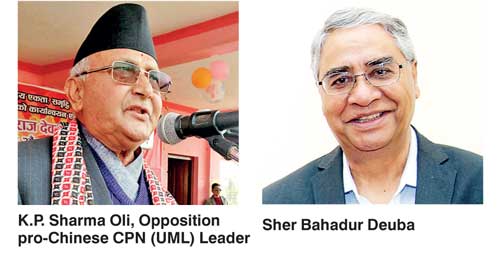Tuesday Mar 03, 2026
Tuesday Mar 03, 2026
Saturday, 10 June 2017 00:05 - - {{hitsCtrl.values.hits}}
India, which has always played a critical role in Nepalese politics, may have to play a role in helping the new Government of Nepal headed by Nepali Congress (NC) Leader Sher Bahadur Deuba to meet his constitutional obligation to hold the local bodies’ elections on 28 June, and provincial and federal elections by January 2018.
More specifically, India could help clear the stumbling block put by the Madhesis, a large community of Indian origin people living in the thickly populated Terai or plains region of Nepal. 
The Madhesis, who feel discriminated against under the new constitution and want it amended to increase their representation in the elected bodies and in the Government, boycotted the first phase of the local body elections held in three provinces on 14 May and have threatened to boycott the second and the last phase of the polls to be held in four provinces on 28 June also, if their demands for constitutional amendments are not met before that.
The Madhesi boycott of the second phase could have a telling effect on the political prospects of the India-friendly Nepali Congress-Communist Party of Nepal (Maoist Centre) alliance, NC-CPN (MC) alliance for short, which is running the Government now.
But the man directly affected will be the NC Chief, Sher Bahadur Deuba, who took over as Prime Minister from his coalition partner, CPN-(MC) Chief, Pushpa Kalmal Dahal alias Prachanda, this Wednesday.
In case of a boycott, the pro-Chinese CPN (Unified Marxist Leninist) or CPN (UML) for short, led by K.P. Sharma Oli, will gain. If that happens, the political clout of CPN (UML) will increase to help it put up a good fight in the parliamentary elections in early 2018.
The pro-Chinese party had already emerged as a powerful force in the first phase of the local body elections. It topped the list, though it was second if the seats secured got by the coalition partners, NC and CPN (MC), are combined.
Madhesi participation in the second phase will upset the CPN (UML)’s chances. There are Madhesi parties to vote for, but many Madhesis may vote for NC or CPN (MC) as these parties have been amenable on the question of constitutional changes and are also friendlier to India than the CPN (UML).
In fact, the CPN (UML) has out rightly rejected further constitutional amendments to satisfy the Madhesis. That party also looks at the Madhesis as India’s proxies in Nepal and is hostile to their political and economic demands.
If any party can persuade the Madhesis to participate in the June 28 polls, it is India. India had supported them in their earlier agitations over the last few decades. However, this is not an easy task as India had tried to get them to participate in the first phase and failed. The Madhesi parties strongly felt that unless they put heavy political pressure on the main Nepalese political parties, their demands will never be met. 
The Madhesis want three districts in Eastern Nepal (Sunsari, Morang and Jhapa) and two in Western Nepal (Kanchanpur and Kailali) to merge with Madhesi-populated provinces. But other communities oppose these demands, especially the influential Nepalese Brahmins and Nepalese Kshtriyas. All major parties are also opposed.
During the India-backed Madhesh Andolan (Madhesi agitation), 11 policeman and a two-year-old child of a policeman, were killed by Madhesi protesters. Since then, anti-Indian sentiments have risen in Nepal.
The other issue agitating the Madhesis, is delimitation of electoral constituencies. The new 2015 Constitution reduces the weight given to proportional representation. The Terai region, where the Madhesis live predominantly, accounts for 51% of Nepal’s population, but it got only 75 out of a total of 165 seats under the First Past the Post System, instead of 83, as per its population. The Madhesis want a change in the system which will reflect their size. But the other political parties argue that if population size is given primacy, sparsely populated hilly districts will be adversely affected.
The NC-CPN (MC) Government has been saying that these issues can be considered by a Federal Commission. India would like them to look at the issue in a broader perspective and show more flexibility. But the Madhesis want their demands met here and now.
The Madhesis must also realise that the NC-CPN (MC) Government does not have the required numbers in parliament to carry out constitutional amendments, given the CPN (UML)’s opposition to these demands.
In the Parliament of 593 seats, NC has 207; CPN (MC) has 82, the Rashtriya Prajatantra Party (RP) 37; and CPN (UML) has 181. A number of smaller parties account for the remainder.
The Prime Minister has to keep his flock together also. The formation of a Council of Ministers is problematic. A faction of the NC led by Ram Chandra Paudel nearly boycotted the swearing-in of Deuba on Wednesday. Paudel complained that Deuba had not discussed ministerial portfolio distribution with the party Working Committee or even the parliamentary party.
The Rashtriya Prajatantra Party (RPP) complained that Deuba had promised to consult it before announcing a seven member cabinet on Wednesday, but did not. As on date, there is no one from RPP among the seven. The fringe groups in the coalition are also demanding their pound of flesh. The main constituents, NC and CPN (MC), are themselves not sure how many and what portfolios each will get.
Instability has been a dominant feature of Nepalese politics. The country has had 10 Prime Ministers in the last 10 years. Deuba himself has been Prime Minister three times before under unstable conditions.
His first term (1995-97) was marked by Maoist violence. His second term (2001-2002) ended abruptly when the King sacked him for alleged incompetence in tackling the Maoists; and his third term (2004-2025) ended in his ouster by a military coup engineered by the King.